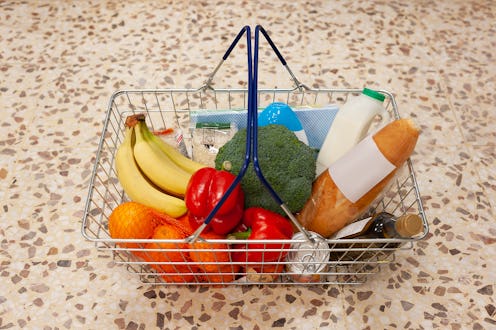Life
Should I Disinfect My Groceries? Your Lockdown Food Shopping Questions, Answered

A lot has changed due to COVID-19, most noticeably the way we shop. To keep Brits safe, rules have been set in place in supermarkets to help avoid the spread of the virus through social distancing and the disinfection of trolley and basket handles. The rare times I've gone out to grab some essentials, I've made sure to wear gloves to avoid potential contamination in store. But do I need to disinfect my groceries once I bring them home?
At the moment, there has yet to be "evidence that transmission is happening through food packaging," as Dr. Julia Marcus, assistant professor at Harvard Medical School and Harvard Pilgrim Health Care Institute, tells Bustle. While that "doesn't mean it's not possible," Marcus says that the risk is "probably low" at this point in time.
Marcus advises to wash your hands after putting your groceries away, and then "again if you open any containers soon after shopping." If the virus were to be on any products you'd purchased, "it's very unlikely for [it] to still be viable on any surfaces after a few days." As Marcus recently told The Guardian, a study by The New England Journal of Medicine found that COVID-19 can survive on surfaces for quite some time, and was "still detectable on copper for up to four hours, on cardboard for up to 24 hours, and on plastic and steel for up to 72 hours."
"But it's important to note that the amount of virus decreased rapidly over time on each of those surfaces," the doctor added. "And so the risk of infection from touching them would probably decrease over time as well."
As Public Health England notes, the World Health Organisation (WHO) "advises that the likelihood of an infected person contaminating commercial goods is low," along with "a package that has been moved, travelled, and exposed to different conditions and temperatures."
If you are concerned about contaminating surfaces in your home, Marcus recommends using "disinfectant wipes on any nonporous containers, like glass or metal" before putting them away. For product in other materials like cardboard or plastic, it's worth taking the product out, throwing the packaging away, and washing your hands. As Dr. Akiko Iwasaki, professor of immunology at Yale University, told The Guardian, "Take any measures that you can to minimise the contact from the surface of the package to your face."
For raw produce like fruits and vegetables, the NHS recommends to wash these with water, which is general practice outside the virus to prevent food poisoning. "It is always advisable to wash all fruit and vegetables before you eat them to ensure they are clean to help remove bacteria from the outside," the advice reads. "Peeling or cooking fruit and vegetables can also remove bacteria."
This article was originally published on